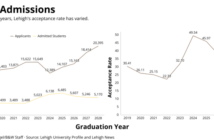
Musa Jamshed
They say insanity is doing the same thing over and over again while expecting a different result, and every year, that’s exactly what students attending private universities do.
We pour out our savings and take out loans because it’s what we need to do to attend highly ranked schools, and when the audacious price for another year is released to the public, we gape at the new figure in disbelief.
You could say that college tuition is driving us insane.
Lehigh recently announced that the total cost of attendance for the 2019-2020 school year will be $69,650. It’s ridiculously steep, but if you look at the trends and weigh the cost of the university’s ambitious Path to Prominence plan, it’s not so surprising after all.
But is it worth it?
If you’re attending Lehigh, or any other private university, you should be asking this question. At the very least you should be pondering what aspects of your college education are most valuable and what aspects you could do without.
Would an online course be satisfactory in place of a traditional one? Is the rise of studying abroad and exchange students altering the global workforce? Does Greek life have a future on college campuses? Is it better to select a major based on an institution, or an institution based on an intended major or program?
I know, it’s a bit overwhelming to juggle all of these factors at once. But now that I’m a second-semester senior, I have a lot more time on my hands to weigh these fundamental inquiries. That’s why I’m bringing this column to you with curated deep-dives into issues that affect Lehigh and the greater educational community.
And now that you’ve made it this far in the article, you must have enough time on your hands to come along for the ride.
In the rest of this first installment, I want to introduce you to the surprisingly simple economics that drive the system I’ll be investigating moving forward.
Shouldn’t people stop attending college because it is so expensive?
On the contrary, I found out that the net value of a college degree has been rising when my microeconomics professor broke it down my sophomore year. Having a college degree is becoming such an advantage in how one is assessed entering the job market that it hardly matters how much you pay — your future earnings will eventually pay you back mid-career.
According to a 2016 report from College Board, the break-even age is 31 years old after attending four years at a public or private nonprofit institution with a typical amount of aid.
In fact, in the same report — which, by the way, reads a lot like a self-fulfilling prophecy and is literally entitled “Education Pays” — it’s revealed that for the average adult aged 25 or over, having a bachelor’s degree alone represents a $24,600, or 67 percent, advantage in earnings compared to stopping at a high school diploma.
There is undoubtedly incentive to go to college. The only question becomes how anyone outside the upper class is supposed to afford it.
And before I get to the terrors of loans, there’s a lesser-known phenomenon that needs to be out in the open: In 2018, 45 percent of private undergraduate tuition went toward financial aid.
By definition, private universities are price discriminating.
In a hypothetical group of four students, if just one of them can afford to pay Lehigh’s almost $70,000 price tag, it can distribute more than $10,000 to each of the others. It’s a Robin Hood effect.
On the surface I’m in favor of this redistribution to ensure education for the masses, but in practice, it gives colleges the green light to keep raising costs until their wealthiest attendants can no longer afford it.
I’m especially skeptical because we see colleges take similar advantage of traditional aid avenues as well —governmental loans, grants and tax credits that help students cover their payments.
Because private colleges know that government funds will continue to increase when college costs go up, it’s a never ending cycle.
And yes, that leads to major debt. Even if loans aren’t the main way to finance college, we’re growing the total cost so much that the average 2016 graduate emerged $37,000 in debt.
In summation, private universities are like hagglers who charge a child $50 for a yo-yo because they know they’ll tell their parents they need it and there’s an ATM next door. Except we’re not talking about a yo-yo — people actually need an education.
It’s screwed up, and that’s just the economics of it. I can’t wait to go more into the actual substance behind this essential-yet-torturous system in future articles.
Of course, solutions are complicated and you should be wary of anyone who tells you they have a quick fix for college education, but you should be in the business of brainstorming answers and holding the institutions accountable who drive us insane and see no push-back from the market.
I’d like to redefine insanity from the perspective of decision makers at private universities as the process of exploiting over and over again while expecting no burden of guilt because you’ve gotten away with it.
That’s what we’re up against.





Comment policy
Comments posted to The Brown and White website are reviewed by a moderator before being approved. Incendiary speech or harassing language, including comments targeted at individuals, may be deemed unacceptable and not published. Spam and other soliciting will also be declined.
The Brown and White also reserves the right to not publish entirely anonymous comments.
4 Comments
Musa,
At what point do you stop and recognize that they’re playing a game of chicken with your parents, and that your parents have the upper hand? Let’s take a look at upside and downside if your parents — or, in an organized fashion, a quarter of the parents — say “no, get outta here with that garbage, here’s what we’ll pay”:
A) You win. Lehigh is under intense pressure not to fold, because if it folds, all the other universities at similar price points freak. Not because Lehigh’s dropped its price, but because it’s been seen to cave, which means the same can happen elsewhere. Though also because Lehigh’s dropped its price, because you’ll notice that all the schools increase tuition in lockstep, justifying it with “this is the going rate”, which is just an ordinary oligopolistic move. Solution: Start quietly so that the story doesn’t make it to the higher-ed trade journals (Inside Higher Ed, Chronicle of Higher Ed), which would be a scandal that had reverb for decades. But make it clear to admin that you guys are happy to make a scene. There are also, at this point, graceful exits available to Lehigh: other private universities have dropped tuition in the name of broadening appeal and opportunity and simply in the name of civic-mindedness. What really happened at those schools? Well, you’d have to be there to know, wouldn’t you.
Lehigh will, incidentally, pull an “if you don’t pay I’ll shoot this dog” maneuver in the form of threatening fin aid and saying that you’re only going to hurt the needy. Lehigh’s not that worried about the needy. Here’s how readily they’ll do it, btw: when I was a grad student there, and I knew something about how bookstores operate, I looked at the massive pillage going on in the bookstore and publicly suggested an off-campus, student-run at-cost textbook co-op, and there was starting to be some conversation about it. Next thing I know I’m in an office with a bunch of VPs talking very genially at me about how the poor cashiers would lose their jobs and their ability to send their kids to Lehigh for free. They were practically dabbing their eyes with their silk ties at the thought. They’re not going to have any more shame about these things now, but you can freely translate “but the needy” as “we got nothing but hope you’ll bite.”
They play the same games with students and parents over and over in higher ed because you guys come and go like mayflies. Four years, goodbye. By the time you understand the system well enough to fight effectively, you’re done, wallets denuded, it’s not worth your time to fight, and you’re not going to think about it again till your own kids are ready for college. They understand this, but it means the tactics don’t change much, which means they’re also well-known.
B) Lehigh kicks you out. Okay, now you’re done with Lehigh. What does that mean? At the very worst, it means you graduate from a state university. Does this doom your life? No, of course not; you may actually find that you have more opportunity at the big place, particularly if you’re in STEM, because an R1 university has enormous troves of federally-funded research gear and much larger research programs than an R2 like Lehigh does. Nor should you look at state-U averages for earnings, etc., because that includes students who could not possibly have gotten into Lehigh and students who started out from much less privileged backgrounds. For a realistic measure you’d need to look only at the Lehighlike students at your state U, which costs less than half of what Lehigh costs before scholarships. A thing private-U students also often overlook, when looking at state Us, is that good/bright students are what keep the profs alive. They were all top students, and many of them went to fancy schools for their PhDs, and unless they’ve reallly messed up, those alumni friendships are also still strong. If you show up and say “hello, I will warm your professorial heart with my drive, intelligence, curiosity, and interest in the thing you teach, how about pretending like I’m a grad student and loading me up with the stuff you actually want to teach but don’t often get to,” you will get many times the value of your tuition out of them, plus rec letters that glow so brightly they can be seen from space.
So let’s look a little more closely at that (B). What don’t you get at the state U?
– Lehigh is particularly good at one thing: teaching students to network like it’s the air they breathe. That’s an extremely valuable skill, and Lehigh’s entire culture supports it. It’s also one you can develop on your own. Is it harder to do when the culture around you doesn’t promote it day and night, yes, no question. However, you know how to find people and shake a hand. You don’t need to pay $150K at the age of 20-ish to have people help you practice it. (As a simple exercise, please find the future value of $150K conservatively invested after 45 years.)
– Lehigh does concierge service and protects you, to a point. If you’re not someone who’s ready to find your own way in a crowd of 40K students, or maybe you just don’t have a lot of sense, then yes, your parents may need to pay extra for the boutique service, or stand ready to guide you through your state-U experience pretty intensively. Of course, that does leave me wondering how you’re going to use Lehigh’s training, because Lehigh is pointing you at world capitals.
– Your alumni experience may vary. Some programs at state Us do an excellent job of maintaining connections among alumni. Alumni from my state-U grad program are still a big part of my life 25 years on, and all the usual networking etc. goes on there too. Actually an alum from a few years before me is coming to visit at the end of the week. But unless you’re a rabid college sports fan, the state u’s going to be too big, and the students not nearly rich enough, to do the sort of alumni-courting and club-maintaining that Lehigh does. You’ll also find grad programs that do essentially no alumni outreach/cultivation, because all their energy goes to survival and getting current students through.
– Depending on where you are, your profs may be much better at preparing students for academia than for business or professional grad programs. Location matters, so you’d need to check that out before applying. For the biz side you can gauge the industrial focus roughly by the number of adults walking around in suits as though suits are normal things to wear, also by the intensity with which students are shoved towards corporate co-ops and internships.
That’s about it. Oh, landscaping and architecture. Landscaping and architecture are dreadful at most of the state Us.
I’ll put it another way: if your parents are so rich that they don’t feel $2K a week for a luxury liner that holds classes, enjoy your time at Lehigh. Otherwise, they really don’t have to do this. It’s also screwing every poor kid in the country, because the Lehighs of the world keep justifying price increases at the supposedly public state Us, which much of the public can no longer afford. It’s not good for anyone that you guys keep shelling out like this just because you’re scared you won’t be able to go to fancy enough life parties if you don’t.
Interesting reading. It would be interesting to see how LU tuition relates to inflation. I would say LU is less of a bargain now than it has been. Also to consider is that LU is getting bigger; it has gone from being a place where you knew everyone, a long time ago, to where you could identify with a good percentage of the undergrad population to now. Do current students only relate to organizations they are a part of but not the university as a whole? Is there a reasonable advantage to the student and family for the extra money?
Tuition all over runs at multiples of inflation, has done for decades. That’s why students have been so screwed for such a long time now.
One of the other factors is institutional debt — universities borrow to build, borrow to buy land, etc. At public U systems the scale is vast, in the billions. Collateral/ratings come in the form of expected ability to jack tuition/fees/etc.; after all, nobody really wants to repo a university building. Lehigh will already have draft increases that stretch out for years to cover Pathway costs and whatever else was still on the books.
Lehigh’s kind of stuck, when you look at it — boutique regional engineering school that’s made efforts to be something more, has grown slowly and added other core areas, but is still quite small (esp given vastly increased numbers of kids going to college in the last few decades), invisible away from the collegiate seaboard, in an undesirable location except for its proximity to desirable locations, and still not a recognizable “oh, they’re very good at –” outside engineering and wrestling. The industrial world that made Lehigh a hot idea is long since rusted and collapsed, and the industry that used to make the regional corridor has drifted out across the country/world. The efforts in other directions are difficult, too — too much competition in biz, ed’s constrained by the fact that PA only needs so many superintendents and PSU and other schools have programs, too. Lehigh’s not on the map for arts/humanities, and not really there either for soc sci. International biz is an interesting strength, but I don’t perceive it as a visible powerhouse. Growing to the point where waves aren’t closing over the little school’s head and trying to throw money into health are probably a good ideas — make themselves noticeable, connect to Phila.-region healthcare strengths, though again there’s real competition in that space; you have to try to hook it to biz or something else, and I hope the vision there is clear and well-informed. But I suspect you can translate “pathway to prominence” as “we have to get more noticeable and prestigious somehow or die”.
My guess is that if the trends continue, and they aren’t great, Lehigh will wind up becoming an affiliate campus of a large university system that’s got tentacles all over. A Cornell, an ASU. Consolidation goes on in the university world, too. It’s always tricky, because the question for alumni is “are we marrying up or down”, and…it’s not always up. The same things will then happen at Lehigh as happen whenever a big company goes collecting. Core strengths retained and reoriented, the rest ditched, streamlining, downsizing, rightsizing, call it what you will. Employee benefits stripped, new marketing/product-development schemes devised. Integration into the big company’s program. At that point we have to wait for state governments to remember what the job is, with citizens and all, and decide they like the idea of educated populaces again. If I had to bet, I’d say that’s, oh, 15-20 years out. Gotta give the kids who’re arguing with their congresscritters time to grow up, go to law school, get into office, and take the reins. They’ll have help from millennials.
Regardless, current and near-future students will pay out the wazoo for the expansion. Unless they put their collective feet down and refuse. Then the admin has no choice but to turn to alumni and get slightly more real in the messaging, and if that’s a bust, well, hey. Things change, and it’s a little nutsaroo to pay $300K for a bachelor’s degree in anything, doesn’t matter who you are.
Administrators, you know, you’re welcome in this conversation. God only knows what I’m getting wrong up there.
I’m only hearing crickets